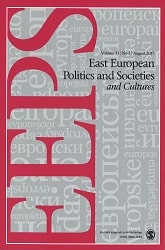Reassessing the Communist Takeover in Romania: Violence, Institutional Continuity, and Ethnic Conflict Management
Reassessing the Communist Takeover in Romania: Violence, Institutional Continuity, and Ethnic Conflict Management
Author(s): Stefano BottoniSubject(s): Political history, Government/Political systems, Studies in violence and power, WW II and following years (1940 - 1949), History of Communism, Ethnic Minorities Studies, Politics and Identity, Peace and Conflict Studies
Published by: SAGE Publications Ltd
Keywords: Sovietization; Romania; 1944-1948; ethnicity;
Summary/Abstract: This article analyzes the communist takeover in Romania as the successful outcome of a long-term policy aiming to make the Romanian Communist Party (PCR) a national force. Such an attempt deserves a new analytical explanation of the highly controversial notions of institutional continuity and of “nationalization” of its membership. While mainstream explanations still focus on factors of change motivated by external (Soviet) pressure and stress that violence, coercion, and intimidation have been main instruments used by the Communist Party to implement its goals, the author argues that a reevaluation of the real extent of popular support is needed. PCR became a national mass party immediately after the coup d’état of 23 August 1944. At that time a marginal political force, traditionally ruled by non-Romanian elements and devoted to the strictest internationalism, turned national without falling into discrimination against minority groups, with the exception of the Germans. In multiethnic Transylvania the ethnic power balance consciously created by PCR with Soviet assistance helped the party to strengthen its political legitimacy among different national and social groups. Unlike the Romanian historical parties and the Hungarian nationalists, the PCR and the Petru Groza–led coalition government behaved as a transnational body and pursued integrative policies. In the troubled context of postwar reconstruction, this call for cooperation and peaceful ethnic coexistence distinguished the PCR and its allies from the opposition parties and significantly contributed to make early communist rule more acceptable to large masses of Romanians and non-Romanians, as well.
Journal: East European Politics and Societies
- Issue Year: 24/2010
- Issue No: 01
- Page Range: 59-89
- Page Count: 31
- Language: English
- Content File-PDF

